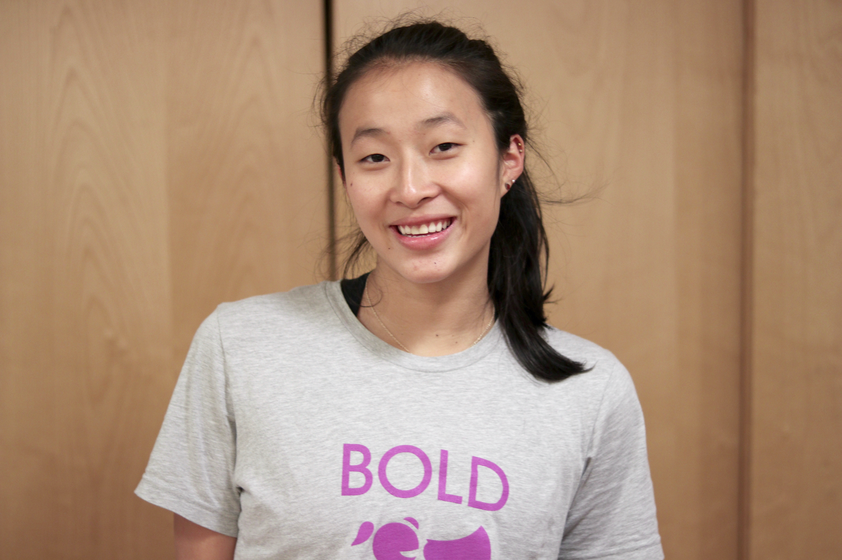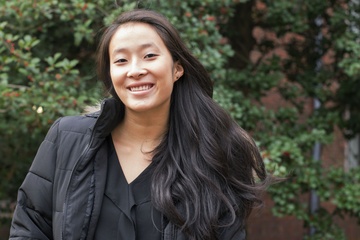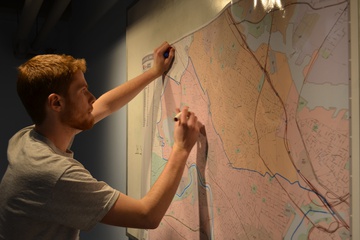On the front steps of Boylston Hall, Will H. MacArthur ’20 poses—or tries to pose—for a portrait. After several awkward attempts, he laughs and gives up. MacArthur ran for a seat on the Cambridge School Committee in the November 7 municipal election, and while his campaign was unsuccessful, he’s not taking the loss too hard.
“My personal well-being might not necessarily be maximized by being on the School Committee as compared to being in college. On a very individual level, I’m not distraught,” MacArthur says. That said, he worries that the re-election of every incumbent who ran means that the school committee is unlikely to see meaningful change. “On a community level, I was sad that I didn’t win.”
MacArthur was one of two sophomores who ran in Cambridge’s recent municipal election; Nadya T. Okamoto ’20 ran for a seat on Cambridge’s City Council. Her campaign, too, was unsuccessful.{shortcode-9f0c0a97de4a14c74896b4249e4d87e3ed488376}
Yet Okamoto says she found solace in the election’s large voter turnout. Excitedly, she scrolls through a series of maps displaying the increase in voter turnout in Precinct 2, Ward 2. Voter turnout in this area, which is almost entirely occupied by MIT students, increased by 252.8 percent since 2015—the largest increase of any Cambridge precinct. “That was what I was celebrating today,” Okamoto says.
Indeed, running for City Council hasn’t always been Okamoto’s goal. She only became involved in Cambridge politics six months before she began her campaign, and says she quickly grew passionate about local issues. “This seems to be the only way that people are going to listen to what I have to say,” she says.
Many Cambridge residents, however, were dubious.
“She was heavily criticized from the get-go—and we knew this—for not being from Cambridge,” Okamoto’s campaign director Claira P. Janover ’20 says. “I really wanted people to see that there’s something really strong about telling people that they can run for office regardless of circumstance.”
MacArthur’s campaign faced the same challenge: His press director and former Cambridge Rindge and Latin School classmate Diego L. Lasarte, a student at Bowdoin, describes aspects of the campaign process as a “quest to justify your Cambridge chops.”
“People are very defensive when it comes to outsiders coming into their city,” Lasarte says. While campaigning for MacArthur, Lasarte made a point to always mention MacArthur’s status as a lifelong Cantabrigian and a graduate of CRLS before saying that he was a Harvard student.
But MacArthur’s deep roots in Cambridge didn’t make campaigning any easier for him. He remembers holding signs and meeting Cambridge residents in Porter Square several weeks prior to the election. When he introduced himself and said “I’m running for school committee” to a passerby, he was met with a brisk “I don’t care.” This was a common response.
“I legitimately laughed,” MacArthur says. “That sums up so much about how people engage with school committee politics.”
While MacArthur doesn’t plan to run in future local elections, he intends to stay involved in Cambridge politics. “I’m perfectly happy continuing to make a difference in Cambridge outside of elected office, and being a student here,” he says. “I’ve got my Participatory Budgeting shirt. My next goal is to get turnout for that.”
His t-shirt, which reads “PB Cambridge,” refers to the $800,000 in the city budget that is allocated by popular vote. The vote is open to all Cambridge residents who are at least 12 years old, including non-U.S. citizens and university students. In years past, youth turnout has been low.
Okamoto has a similar attitude. “I’ve already started emailing a lot of the people who were elected and community leaders I met to be like, ‘What can we do now? What do you think is the best way I can channel my efforts?’” she says. “If you’re living here, you’re part of the community, whether you like it or not.”




